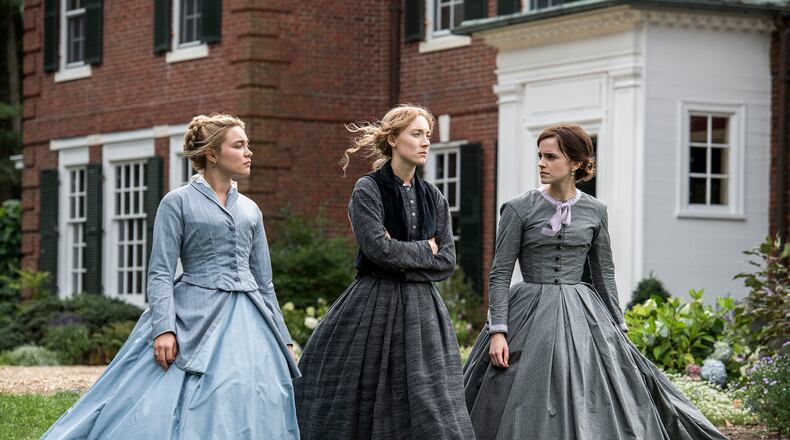There’s something perfect about Greta Gerwig adapting “Little Women.” Louisa May Alcott’s semi-autobiographical ode to sisterly love, competition, creativity and lofty self-sacrifice could have been written as vehicle for Gerwig to star in, its rambunctious spirit utterly of a piece with her penchant for unpredictability and barely contained physicality.
As it happens, Gerwig isn’t in “Little Women,” but as a writer-director she maintains a constant benevolent presence. This intelligent, exuberantly affectionate iteration of the classic novel doesn’t mess with the bones of Alcott’s beloved work: Meg, Jo, Beth and Amy March are still nestled cozily with Marmee in their modest saltbox home in Civil War-era Massachusetts.
In Gerwig’s capable hands, even the most familiar contours of “Little Women” feel new, not because she has the temerity to redefine Alcott’s masterpiece, but because she subtly reframes it. For one thing, she focuses as much on the March sisters as adults as children, toggling back and forth in time to accentuate the realities of growing up vs. the wild and honeyed memories of a charmed childhood.
The time shifts can be jarring as “Little Women” gets underway, and Gerwig front loads the film with not one but three lively dance scenes, each meant to delineate a stratum of 19th century social class. The energy, at least at first, feels scattered and unfocused. But once the movie finds its feet, the characters reveal themselves. Eldest Meg (Emma Watson) wants to be a wife and mother; little Amy (Florence Pugh) an artist. Ethereal Beth (Eliza Scanlen), “the quiet one,” plays the piano beautifully, while Jo furiously writes whatever comes into her head - usually a play that the foursome act out with unbridled theatricality. With their father away at war, the March household is overseen by their nurturing, idealistic mother Marmee (Laura Dern), as well as the more vinegary Aunt March, played with amusing tartness and fed-up side-eye by Meryl Streep.
Attractively designed and filmed and set to a gorgeously lush musical score by Alexandre Desplat, “Little Women” could be seen as the urtext for everything from “Sex and the City” to “Keeping Up With the Kardashians,” wherein like Laurie, the audience watches the female protagonists, not as an act of pure observation but of identification and self-definition. Long before viewers debated whether they were a Carrie or a Samantha, women (and surely more than a few men) wondered if they were Jo the tomboy or Meg the romantic. The genius of Gerwig’s version is that it preserves that deep psychological pleasure of “Little Women” while acknowledging that all of those archetypes existed — and still do — within a rigged system.
It bears noting that Laurie is played by Timothée Chalamet, whose languidly graceful performance is almost Keatonesque in its playful physicality. As in Gerwig’s directorial debut “Lady Bird,” he and Saoirse Ronan are terrific foils in an unrequited love story for the ages. This is a big, generous-hearted movie, as smart as it is pretty; as an homage to female ambitions, appetites and irrepressible will, it feels both true to its period and entirely of the moment. It would be hard to find a “Little Women” more suited to its times, for love or money.
MOVIE REVIEW
“Little Women”
Grade: B+
Starring Saoirse Ronan, Emma Watson and Florence Pugh. Directed by Greta Gerwig.
Rated PG for mature thematic elements and brief smoking. Check listings for theaters. 2 hours, 15 minutes.
Bottom line: A big, generous-hearted movie, an homage to female ambitions
About the Author
Keep Reading
The Latest
Featured


